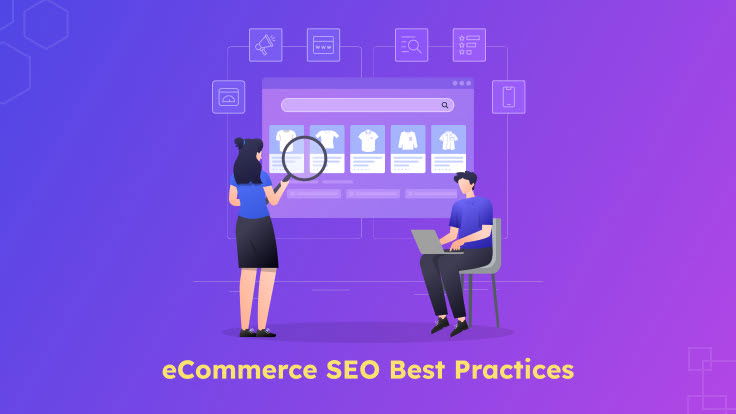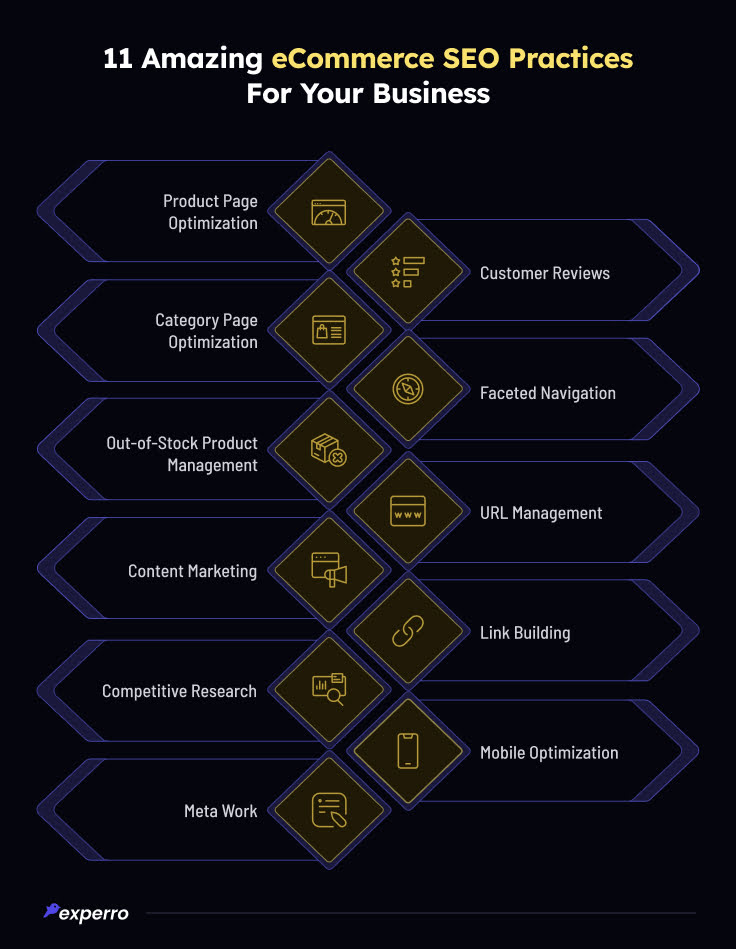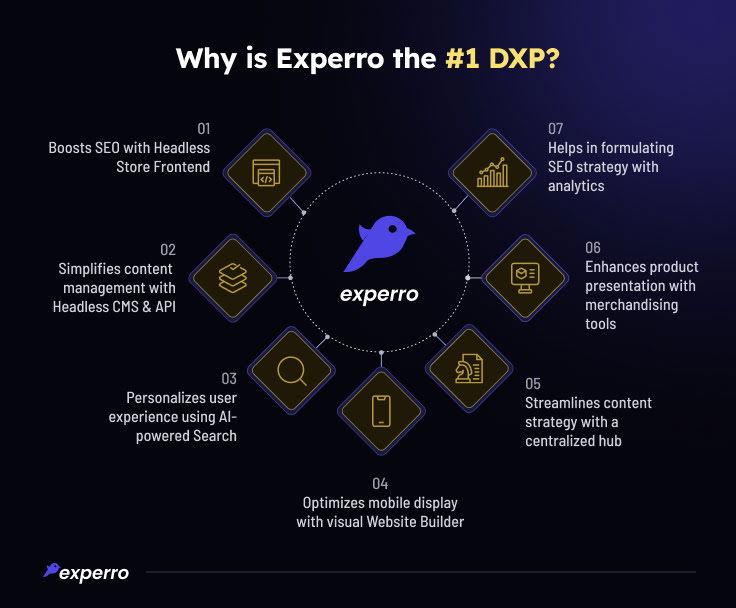Top eCommerce SEO Best Practices for Growth in 2025

What’s Inside
- What Are the Top 11 Ecommerce SEO Practices?
- Want to get an edge over your competitors?
- How Can Experro Help You to Follow eCommerce SEO Best Practices?
- Congratulations! Your search is over!
- Conclusion
KEY TAKEAWAYS
- Following SEO best practices for eCommerce is the only way to ensure your online store's success.
- Content marketing and customer reviews boost trust and help you stand out from others.
- The blog outlines 11 essential eCommerce SEO best practices, from optimizing product pages to mobile optimization, that can boost website performance.
- Experro is a complete DXP that helps you align with the best eCommerce SEO practices.
Did you know the top Google search results spot boosts visibility?
It has been observed that the first link on a Google search page gets about 27.6% of all the clicks. And, if your website is on the second page, it might only get 0.63% of clicks. How sad, isn’t it?
If you own an online store, knowing eCommerce SEO best practices for eCommerce sites can make a difference significantly. It's all about making your site easy to find and attractive to search engines and customers.
Using the right eCommerce SEO strategies can help your website get noticed by search engines. It's not just about being at the top of the search results; it's about staying there consistently that counts. You can get a boost only if you rely on the #1 solution among the best eCommerce platforms for SEO.
Let’s understand the best SEO practices for eCommerce that are discussed below.
What Are the Top 11 Ecommerce SEO Practices?

Understanding and implementing the eCommerce SEO best practices is crucial for success.
Here, we will explore 11 best SEO practices for eCommerce website that can significantly improve your SERP rankings.
These practices will strengthen your website's foundation, leading to more sales and a stronger online presence.
1. Optimizing Product Pages with Keyword Research for Better Reach
Optimizing product pages is a fundamental aspect of the best practices in SEO for eCommerce.
To boost your product pages' visibility, use detailed and keyword-rich descriptions. These descriptions should not only be informative but also engaging, helping your products stand out in a crowded market.
Incorporating high-quality images and user reviews can further enhance the appeal of your product pages.
A product page should effectively blend keywords into engaging content. It leads the customer through the product's features and advantages.
Remember, the best SEO practices for eCommerce involve more than just stuffing pages with keywords. Creating a compelling narrative around each product is key.
It makes the product irresistible to both search engines and potential customers.
2. Optimizing Category Pages to Rank Better in SERP
Category pages are often overlooked in SEO strategies, yet they hold immense potential in driving traffic. Organizing products effectively can significantly enhance the SEO of an eCommerce website.
Organic traffic is crucial for an eCommerce site, making up about 33% of all visits. Therefore, it's very important to focus on SEO-friendly content.
Including meta titles and descriptions with naturally inserted keywords on the category page can also boost SEO. These pages should provide a smooth, logical, and easily navigable product browsing experience.
Effective eCommerce SEO best practices for eCommerce sites also involve using breadcrumb navigation and filters to enhance user experience. This approach not only maintains the site organized but even spreads link equity.
A well-optimized category page ranks better in SERPs, enhancing its visibility. Additionally, it helps users in finding precisely what they need. This elevates the overall user experience.
3. Managing Out of Stock Products as Per Customer Choices
Handling out-of-stock products is a challenge for eCommerce platforms. Best SEO practices for non eCommerce and eCommerce sites differ significantly in this aspect.
For eCommerce sites, maintaining live product pages is essential. It's important to update their details about restocking or suggest alternative products regularly.
This approach maintains the SEO value of the page and guides customers to other options, enhancing their shopping experience.
Incorporating the product descriptions is crucial, even for out-of-stock pages. This approach can guide customers towards related products or categories. This is one of the integral eCommerce product descriptions SEO best practices.
As a result, it retains their interest and may lead to alternative purchases. It's a strategic approach to balance customer expectations while maintaining the site's SEO value.
4. Content Marketing to Engage and Convert Customers
Organic traffic is a key source of revenue for an eCommerce site, driving about 33% of traffic. Content marketing is not just about filling your eCommerce website with content.
It involves strategically marketing valuable, relevant, and consistent content to attract and retain a clearly defined audience. This approach ultimately drives profitable customer action.
By understanding your audience's needs and interests, you can effectively plan your content marketing. You can craft how-to guides, case studies, product reviews, informative blog posts, and even engaging videos that showcase your products in action.
This strategy not only boosts your site's SEO but also establishes your brand as an authority in your niche.
Effective content marketing involves storytelling that resonates with your audience. It also involves crafting a brand narrative that resonates with your customers' interests and values.
By providing valuable, engaging, and SEO-optimized content, eCommerce businesses can attract more traffic and build brand loyalty. This approach ultimately leads to driving sales and conversions.
5. Conducting Competitive Research for Content Analysis
Content analysis is another vital aspect of eCommerce SEO best practices. This involves examining your competitors and identifying their shortcomings.
Understanding competitor strategies reveals content gaps and improvement opportunities. This doesn't mean copying what others are doing.
Instead, it's about learning from the market and adapting those insights into your unique strategy.
6. Content Optimization for Featured Snippets in Search Engines
Optimizing meta titles and descriptions is crucial for any eCommerce website. These elements serve as your initial opportunity to create an impression on potential customers in SERPs.
Well-crafted meta titles and descriptions have the potential to increase your click-through rates.
Beyond the meta work, optimizing other content sections is vital for appearing in featured snippets. Featured snippets provide quick answers and boost website visibility in search results.
7. Leveraging Customer Reviews to Build Trust
In eCommerce SEO, customer reviews help make your site look more credible. Encourage your customers to leave reviews of your products and services.
Customer reviews not only build trust but also boost SEO by adding valuable content to your site. Remember, for online shoppers, trust is a key factor in a customer's decision-making process.
This practice works well, especially for eCommerce websites where customer feedback plays a role in building a reputation.
8. Managing Faceted Navigation to Prevent Duplicate Content
Faceted navigation refers to the various filters and sorting options on an eCommerce site, such as size, color, or brand. While these features enhance user experience, they can create duplicate content issues.
Every filter combination can create a new URL, resulting in numerous similar pages. To prevent this, it's essential to use the rel="canonical" tag effectively.
This tag directs search engines to the master page version, preventing duplicate content penalties.
Additionally, strategically using ‘robots.txt’ is vital in managing faceted navigation. This approach involves blocking certain filter combinations from being indexed.
9. Effective URL Management for More Visits
For eCommerce SEO best practices, the structure and clarity of URLs are crucial. Clear, descriptive URLs are easier for both users and search engines to understand.
Including relevant keywords in URLs can also improve a site's search visibility. However, it's important to avoid overly long and complex URLs.
As one of the best SEO practices for eCommerce websites, it's important to ensure that URLs are concise. They should accurately reflect the content of the page. This approach improves search indexing and user experience, leading to increased visits.
Ensuring that your site redirects to HTTPS is a key step in protecting your users' data and boosting your site's trustworthiness. However, only 69% of all websites currently redirect to HTTPS.
10. Link Building and Internal Linking for Better SEO of eCommerce Sites
Internal linking, where you link your blogs or content to other pages on your site, is a key component of eCommerce SEO. High-quality backlinks from reputable sites can highly enhance a site's authority and rankings.
Effective internal linking helps distribute page authority throughout your site and improves navigation.
Additionally, it assists search engines in indexing your site more thoroughly. Remember, both quality and relevance of links are more important than quantity.
To further emphasize the importance of link building and internal linking, it's crucial to understand the role of anchor text. Using clear, keyword-focused anchor text helps search engines grasp the content of the linked page.
Moreover, regularly auditing your site's link profile is a prudent practice. This audit helps identify and allows you to remove or disavow low-quality or spammy backlinks. This also ensures the health of your website's SEO.
11. Mobile Optimization to Make Your Website User-Friendly
In today's mobile-first world, mobile search optimization is an essential part of eCommerce best practices for SEO. A mobile-friendly website enhances user experience and boosts search engine rankings. This involves designing your site to be responsive.
This means it automatically adjusts to fit the screen of any device, be it a smartphone, tablet, or desktop. Also, page loading speed on mobile devices is a critical factor.
Optimizing images, using browser caching, and streamlining code can speed up your website. By focusing on mobile optimization, eCommerce sites can cater to a larger audience.
Additionally, incorporating Accelerated Mobile Pages (AMP) can significantly enhance the loading speed of your mobile pages. This results in an almost instant loading experience for users on mobile devices.
Integrating mobile-friendly payment options is crucial for enhancing the mobile shopping experience. This enhancement can potentially lead to increased conversion rates.
How Can Experro Help You to Follow eCommerce SEO Best Practices?
Integration with Experro, a complete Digital Experience Platform (DXP) can significantly elevate your SEO strategy. This comprehensive solution seamlessly enhances various aspects of your digital presence.

1. Enhanced SEO Performance with Headless Store Frontend
Experro's Headless Store Frontend allows for the separation of the front-end presentation layer from the backend. It makes it highly adaptable and customizable.
The headless store frontend's flexibility directly correlates with improved SEO rankings. When search engines see a website that is easy to navigate and loads quickly, they are more inclined to prioritize it in their search results.
Additionally, having user-friendly URLs further enhances the site's chances of ranking higher in search engine results.
2. Streamlined Content Management with Headless CMS & API
Experro's Headless CMS & API provides unmatched flexibility in digital content strategy. This is crucial for effective eCommerce SEO practices.
Headless CMS separates backend content management from frontend display. This allows for swift content updates without impacting the site's overall structure.
Experro supports rapid adaptation to evolving trends. It helps you to keep your website competitive and maintains high rankings in search engine results.
3. Tailored User Experience with AI-Powered Product Discovery
The AI-powered product discovery personalizes the shopping experience. It suggests products based on user preferences and behavior. This helps a website in enhancing user engagement and reducing bounce rates.
Efficient search experience keeps users engaged, reducing the likelihood of them leaving the site. This positive user engagement influences your site's SEO ranking favorably.
Experro aids in keeping customers engaged on the site for a long time by offering relevant product suggestions. This increased on-site time is beneficial for enhancing your site's search engine ranking.
AI-Powered Search enhances your site’s search functionality, aligning with the best SEO practices for eCommerce. It offers accurate, fast search results, improving user experience.
4. Mobile Optimization with Visual Website Builder
Experro’s website builder ensures that websites are responsive and mobile-friendly. With the increase in mobile shopping, having a site that performs well on various devices is crucial for SEO.
Responsive design enhances user experience and engagement. These are key factors that search engines consider when ranking sites.
5. Efficient Content Strategy via Centralized Content Hub
The centralized content hub in Experro facilitates effective content organization. Additionally, it streamlines the distribution of content across platforms. It ensures that content is consistent, up-to-date, and SEO-optimized across all platforms.
A well-organized content strategy significantly improves site structure. This enhancement makes it easier for search engines to crawl and index your site, thereby boosting SEO performance.
6. Effective Product Presentation with Merchandising Tools
Merchandising in Experro helps in strategically displaying products, which is an integral part of eCommerce SEO. By presenting products in an organized and appealing manner, these tools significantly improve the user experience.
This leads to longer site visits, as customers engage more with the content. Ultimately, this can increase conversion rates, one of the key benefits of eCommerce SEO.
7. Data-Driven SEO Strategy with Analytics
The in-built analytics tools provided by Experro give you deep insights into user behavior and website performance.
It guides you in optimizing your website to meet your audience's needs better. As a result, it improves your search engine rankings.
From AI-powered product discovery to efficient content management, Experro significantly enhances your website's visibility and user engagement.
This integration is not just about adhering to the SEO best practices in eCommerce. It's about setting a new standard in digital commerce excellence.
Conclusion
Mastering eCommerce SEO best practices is more than a necessity in the digital age – it's a strategic advantage. Experro supports you with the journey from optimizing product pages to leveraging advanced analytics tools.
Its versatile solutions encompass everything from content management to user engagement. It is an invaluable asset in your journey toward digital excellence.
It is a complete DXP that represents an overall approach to digital marketing. It aligns perfectly with all the SEO practices.
So, embrace the future of eCommerce SEO with Experro and stay ahead of the curve. Your digital success story begins here. Schedule a call with eCommerce SEO experts today!
FAQs


Pallavi Dadhich
13 June 2024Pallavi is an ambitious author known for her expertise in crafting compelling content across various domains. Beyond her professional pursuits, Pallavi is deeply passionate about continuous learning, often immersing herself in the latest industry trends. When not weaving words, she dedicates her time to mastering graphic design.